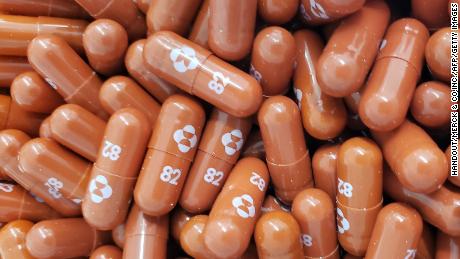(CNN)Drugmaker Pfizer said Friday its experimental pill designed to fight coronavirus reduced the risk of hospitalization and death for high-risk patients taking part in a trial of the drug.
The company hopes it can eventually offer the pill, given in combination with an older antiviral drug called ritonavir, to people to take at home before they get sick enough to go to the hospital.
A so-called interim analysis -- done before the trial was scheduled to end -- showed an 89% reduction in the risk of hospitalization or death from Covid-19 if patients got it soon enough, the company said.
The results were so striking, the company stopped the trial and is preparing to make its case to the US Food and Drug Administration for emergency authorization of the drug.
"Today's news is a real game-changer in the global efforts to halt the devastation of this pandemic," Pfizer CEO Albert Bourla said in a statement.
Pfizer released the results in a news release and did not provide scientists to discuss the data ahead of release. The data has not been peer reviewed or published. The company says it will share more specifics in a peer-reviewed paper and in its submission to the FDA.
On CNN New Day on Friday, Bourla said the company planned to submit data to regulators as soon as possible, maybe before Thanksgiving.
The company has been testing the drug in adults with Covid-19 who are considered at high risk of progressing to severe illness. The volunteers have been randomly given either the pill combination or a placebo within three days or five days of their symptoms starting.
The pill, called Paxlovid and also known by the experimental name PF-07321332, is what's known as a protease inhibitor. It's designed to stop the virus from multiplying. Giving it along with ritonavir slows its breakdown in the body, the company said.
Pfizer said 0.8% of patients who got the drug combination within three days were hospitalized within four weeks -- three out of 389 patients -- compared to 7% of patients who got placebos, or 27 out of 385. And seven of those who got placebos died, Pfizer said. No one who got the treatment died within a month.
"Similar reductions in COVID-19-related hospitalization or death were observed in patients treated within five days of symptom onset; 1% of patients who received PF-07321332 (with) ritonavir were hospitalized through Day 28 following randomization (6/607 hospitalized, with no deaths), compared to 6.7% of patients who received a placebo," the company said.
"It means instead of 10 going to hospital, only one will go, and likely very few, if any, will die," Bourla told CNN.
It said 19% of patients given the treatment suffered adverse events, compared to 21% who got placebo, but declined to disclose what those adverse events were.
Bourla called the results "a great day for humanity," and noted that they came almost a year to the day of the company announcing early results for its Covid-19 vaccine, which the company released on November 9, 2020.
Bourla said the pill could save millions of lives, but he still wanted to emphasize the importance of vaccination. But vaccines are not effective 100% effective, and not everyone will get vaccinated, Bourla said, something that can lead to crowded hospitals and ICUs.
"Now we have a solution for that, and this is exactly where it fits," Bourla said. "This is to treat those that unfortunately got the disease."
Currently, remdesivir, sold under the brand name Veklury, is the only antiviral approved by FDA for treatment of Covid-19. It's given by intravenous infusion, so it's not as simple to administer as a pill.
Get CNN Health's weekly newsletter
Sign up here to get The Results Are In with Dr. Sanjay Gupta every Tuesday from the CNN Health team.
People can also be treated with monoclonal antibodies, which are injected or infused therapies that kickstart the immune system to help fight off infection. They are not as easy to take as a pill and must be administered by a trained professional.
Merck is seeking FDA emergency use authorization for molnupiravir, an antiviral capsule people could take at home. It's been shown to reduce the risk of hospitalization or death by about 50%. On Thursday, UK drug regulators authorized molnupiravir under the brand name Lagevrio.





















